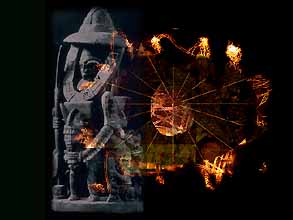The more the world becomes transparent and homogenous because of new communication standards, the sharper the differences stand out with those cultures outside the mainstream of the worldwide cultural transformation. In many cases this concerns cultures and countries so underdeveloped economically that there is no question of their joining the new world order. In some cases other factors enter in, such as the inaccessibility of certain cultural belief systems. But specifically here interactive media technology has the potential to help by making contact with other realities possible at a direct level of experience. For many cultures video as a medium functioned as a bridge to greater accessibility and familiarity. The new media also do this, but their immersive capabilities mean that making contact is not purely a rational, it is also an associative and emotional given. 'Oxum' is an interactive work giving poetical access to a cosmogony that can be traced back to West African mysticism (Yoruba) and its Brazilian counterpart. A woman and child (present as voices) guide you through the concepts and animistic rites. They narrate (in French and Portuguese) anecdotes and customs, and now and again let others tell stories. But there is some difficulty with the interface; just where you would expect help, the navigation and over-designed images and animations are unclear. And the interactive CD-ROM is at times not consistent, not smooth. But the project is still interesting for it tries to get across what it is like to live, to feel, to express oneself in a totally different way and language and to float through an endlessly extended world of demons, spirits and apparitions as though they are tangible entities.
– Willem van Weelden |
Programming: Ciro Palludetti, Katia da Silva
Percussion: Carlos Lillo
Voices: Mima Souza, Catherine Gomes Aubin, Yannick Gelinas
Katia da Silva, 1965, Rio de Janeiro (Brazi)
Lives and works in Montréal (Canada)
|
|
